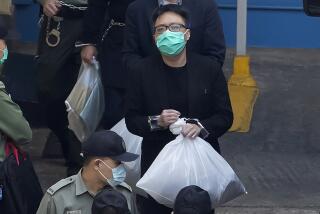China Cites Dissident for Treason
- Share via
BEIJING — Twenty months after he disappeared from sight while in police custody, leading Chinese dissident Wei Jingsheng has been formally charged with the death-penalty crime of attempting to overthrow the government, Chinese authorities said Tuesday.
“An investigation by Beijing’s municipal public security departments showed Wei had conducted activities in [an] attempt to overthrow the government after his release on parole,” the official New China News Agency reported.
The charge against Wei was another blow to China’s tiny, enfeebled dissident movement. For about two years, beginning with Wei’s “disappearance,” the government has moved quickly to snuff any embers of dissent.
Several leading dissidents have been exiled to the United States and other countries. Others, including Wei Jingsheng’s former secretary-interpreter, Tong Yi, have been charged with nonpolitical crimes and sent to labor camps for reform.
The brief news account did not describe any of the alleged crimes committed by Wei, 44, considered the founder of China’s modern democracy movement.
During eight months of freedom in 1993-1994, after he concluded all but six months of a 15-year prison sentence, Wei regularly met with foreign reporters and openly criticized the Communist Party leadership.
In March, 1994, he enraged authorities by meeting with Clinton Administration human rights envoy John Shattuck in a Beijing hotel room.
The announcement of the charge against Wei appeared carefully timed to come after the summit of Asia-Pacific leaders in Osaka, Japan, which was attended by Chinese President Jiang Zemin and U.S. Vice President Al Gore.
In September, Wei was among the leading nominees for the Nobel Peace Prize.
“This is a shocking attempt to silence China’s most prominent dissident,” said Richard Dicker, a spokesman for the New York-based Human Rights Watch. “The charges under China’s criminal section of counterrevolutionary crimes seems to indicate that the government intends to imprison Wei for a long time.”
Reuters news agency quoted an unnamed relative who described the charge against Wei as a “frame-up.”
“Such a big country, such a big party, and yet they cannot tolerate one or two words of criticism. They’re too fragile,” the relative said.
The “counterrevolutionary” charge carries the death penalty as a maximum sentence.
Wei, whose dramatic self-defense in his 1979 trial on charges of selling state secrets has become a classic of Chinese dissent, probably will not receive a public trial. His conviction is virtually assured.
Wei disappeared on April 1, 1994, after being stopped by police on a highway connecting Beijing and the port city of Tianjin. Despite constant inquiries about Wei from world leaders and human rights organizations, he has been held incommunicado since his arrest.
Wei, a militant Red Guard during the 1966-76 Cultural Revolution, first surfaced in the dissident movement as a leader of the short-lived Democracy Wall movement in 1979.
One of his most famous essays, titled “Democracy--the Fifth Modernization,” was one of the first public criticisms of Chinese leader Deng Xiaoping after Deng assumed power in 1979.
Toward the end of his prison term in 1993, Wei also wrote a long, sneering letter to Chinese leader Jiang, who now holds the top three posts in the Chinese power scheme.
“According to my observations,” Wei wrote in a letter subsequently printed in the Hong Kong Lien Ho Pao newspaper, “you are not a wise chancellor like [former longtime Premier] Chou En-lai, nor a crafty old scoundrel who bends with the wind. . . . You have been in office more than a year yet you have achieved nothing.”
In the letter, Wei warned of what he called China’s “home-grown legion.”
“For those who are good for nothing in other respects,” he wrote, “grabbing power and persecuting other people is the only reliable way of protecting their interests.”
More to Read
Sign up for Essential California
The most important California stories and recommendations in your inbox every morning.
You may occasionally receive promotional content from the Los Angeles Times.













